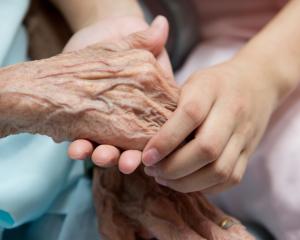That ''stupid clown'' was not on display at the Ronald McDonald houses where she stayed, petition organiser Jacqui Hellyer says.
Mrs Hellyer, of Dunedin, attended the Southern District Health Board's commissioner meeting yesterday to present her online petition, which attracted nearly 12,400 signatures.
She said the stance adopted by the DHB's public health arm was insulting to parents.
Citing concerns about fast food promotion, Public Health South has opposed the idea of a Ronald McDonald facility in the rebuilt Dunedin Hospital.
Mrs Hellyer, whose petition urged the SDHB to change its stance, said parents were ''not stupid'' and knew what was good for their children.
''Those parents that think that fast food is an acceptable daily diet for their children, no advertising or branding, or lack of [it], is going to change that.''
Branding was not overt in the houses.
''In fact I don't even remember seeing that stupid clown there.''
Plaques in the houses freely acknowledged the contribution of other sponsors, not just McDonald's, she said.
She had stayed in houses in Auckland and Christchurch with her daughter.
She especially appreciated the service at Starship Hospital, in Auckland, where, hailing from ''hick Dunedin'', she had not known anyone.
Commissioner Kathy Grant thanked Mrs Hellyer and pointed out the DHB itself had not taken a stance on the matter.
The board was consulting its clinical and community health councils on the need for dedicated family/whanau space in the new hospital.
Comments
It's outrageous that Mrs Hellyer has had to waste so much of her time counteracting the nonsense promulgated by over-qualified and over-paid nitwits.
Ah, you have nailed the real issue Mrs Hellyer, the self proclaimed experts of Public Health South think you and the rest of we plebs are stupid. We are stupid because we have the temerity to disagree with their preferences about what we should eat and drink.
It simply doesn't matter that they continually change their minds over what foods are good or bad, they are all "experts", so we must be wrong.
The issue is the role and funding of a dedicated family/whanau space. More effort by those advocating for MacDonald’s should be put into ensuring such space is planned in the rebuild.
It is naive to ignore the evidence that the public profile of a brand is associated with its public acceptance and indulgence. It is just as naive to imagine that a profit driven company will not think carefully before targeting their gifts to where they have maximum value for the company.
Companies make huge profits from their knowledge that 'plebs are stupid' and hence problems such as the pandemic of obesity.
The article 'Wearing halo of health seemingly incompatible' (ODT, 18/11) provides useful background to this debate. I am a former childhood cancer patient who received similar accommodation long before there was an association with the Ronald McDonald branding (and for that I'm glad). My gut reaction is this woman needs to step back and listen to what the Public Health people are actually saying. Despite no overt branding in the accommodation, it's still there in the name.
Getting into my teens after treatment, several examples of McDonalds unethical global business practices appeared (link below still applies). While it's appreciated the proximity of these current houses meet the needs of families, the debate is about an opportunity the DHB have to follow the example of the Counties Manukau DHB who have accounted for these wider concerns, and acted accordingly. The financial position of DHB's does not mean we have to kowtow to greedy corporates whose motive is to look favorable in the eyes of the public. A pro R McD stance is potentially insulting to the children receiving treatment on this basis.
http://www.mcspotlight.org/campaigns/translations/trans_uk.html
This issue is not about advertising in RMD houses, if that's what you think then you've already misunderstood the opposition. One question is why should the taxpayer accommodate this facility in a new hospital build? These houses allow McD's to cynically masquerade as a company going to great lengths to assist in child healthcare, when in fact the opposite is true. McD's also happily accept that people mistakenly believe they fund the totality of the houses themselves when some of them receive only 20% of their funding from McD's, and that is almost completely from customer donations.














